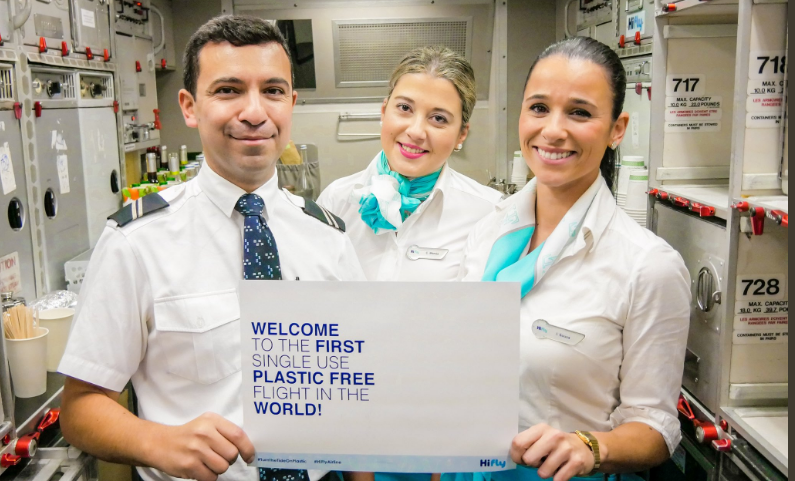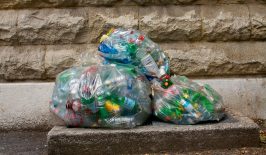A Portuguese airline is aiming to be the first carrier in the world to become single-use plastic free by the end of this year. It’s a positive step – although a miniscule one – in a hugely polluting industry.
2019 might come to be known as the year in which European companies started to be single-use plastic free, inspired by the EU’s new plastic ban. Finally, it seems, policy is being made in response to what has been pointed out by different international organisations for years: that we drastically and urgently need to reduce our plastic consumption and stop ignoring the impact of plastic on our ecosystems and on our health.
Why? Let’s look at some figures. As the UN report Single-Use Plastics: A Roadmap for Sustainability explains, nearly 50 per cent of the plastic waste generated worldwide in 2015 was plastic packaging and 79 per cent of the plastic waste ever produced now sits in landfills, dumps or in the environment. Around 12 per cent of it has been incinerated and only 9 per cent recycled.
Now a Portuguese airline, Hi Fly has joined the burgeoning plastic-free movement, becoming the first carrier to avoid using single-use plastic on its aircrafts. The world’s first single-use ‘plastic-free’ flight took passengers on a Boxing Day trip from the carrier’s base in Lisbon to Natal, Brazil. That was followed by a trial period that saw three further plastic-free flights in addition to a series of 12 reduced plastic journeys to and from Brazil over the Christmas and New Year holiday period.
The sea of plastic that normally decorates the in-flight meal trays – plastic cups, wrappers, cutlery, stirrers and cutlery – was replaced with alternatives made of bamboo, cardboard or other compostable and recycled material. The company also collected any food waste and packaging to send it to a licensed waste management operator where they can be processed for energy production. The president of the company, Paulo Miripuri claims he was driven to start the project because he can no longer ignore the impact that single-use material has on the environment. “Over 100,000 flights take off each day around the world and, last year, commercial aircraft carried nearly four billion passengers. This number is expected to double again in less than 20 years. So, the potential to make a difference here is clearly enormous,” he said in a press release.
And he has a point. Airlines do generate a huge amount of needless waste. An estimated 5.2 million tons in 2016, most of which was buried in landfill or simply incinerated – due to EU animal health legislation that currently dictates that all catering waste arriving from outside EU borders has to be treated as “high-risk”.
Aren’t We Ignoring a Much Bigger Issue?
According to the company, the total weight of plastic saved across the whole trial between Portugal and Brazil of 16 flights – 4400 passengers – was a huge 1500 kg. It’s clearly a well-intentioned move from the company and maybe by achieving what seemed impossible will encourage other airlines to follow suit.
But there is a huge elephant in the room here, a much bigger issue that the company is very notably not addressing – the incredibly polluting act of flying itself. On an individual level, there’s no other human activity that emits as much carbon over such a short period of time as aviation – because it is so energy-intensive. Flying accounts for more than 2 per cent of global emissions, and thanks to government subsidies and low cost airlines, it’s cheaper and easier than ever to buy into the jet-setting lifestyle.
More people are flying than ever before. It would be wrong – not to mention unrealistic – to put limits on people’s freedom to fly or to dictate who is allowed to fly where and when and how often. The industry itself is working on innovations that could make flying more sustainable, such as electric planes, and ones powered by alternative biofuels, even by landfill. But at the end of the day, maybe the most effective thing we can do is think twice about taking the plane for shorter trips, stay on the ground wherever we can, and follow Sweden’s lead to take the train.
This article is a collaboration between Ana Galan and Marisa Pettit.








